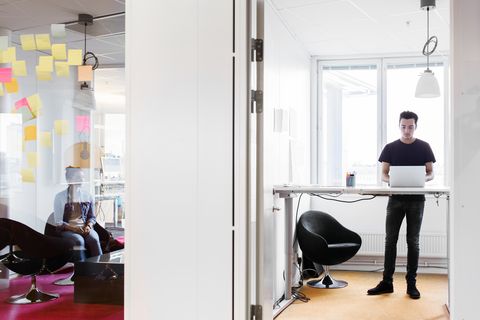
Here at the Men’s Health offices, you see quite a few standing desks. And the reason seems, well, reasonable: with so many studies highlighting the maladies of prolonged sitting, standing appears your best ally. But according to a recent New York Times article, we may all be putting too much stock in standing up. So we sat down (sat down!) with Michael Fredericson, MD, FACSM, Director of PM&R Sports Medicine at the Stanford University Medical Center, to answer the essential office fitness question: whether ’tis nobler to stand or sit at work.
Much of the standing at work buzz began with these studies that followed thousands of adults over several years and found greater-risk mortality for those who sat for at least 12 hours a day. But then studies started coming along to complicate these findings. They suggested that we might be seeing correlation rather than causation — that prolonged sitting may be an indicator of other poor heath factors and not a cause itself of poor health. And then we have studies that suggest the complete opposite: that standing might actually be worse for you! So what’s going on?
Well I think part of it is that people are aligning a lot of different variables. First in relation to developmental back pain. Another in relation to overall fitness. And then in terms of cardiovascular risk.
In terms of back pain, we know that that sitting too long is definitely bad for your back. As you move from standing to sitting, the pressure in your disks increases. So when you sit too long (and particularly when you stay in the same position all day) your disks will tend to bulge out more. This is because you lose some of the hydration in the disk when you remain in a fixed position. For spine health, you definitely don’t want to sit all day. Standing is better than sitting, but just standing up in the same position all day is not great for your back either.
In relation to general health, there are a number of studies coming out saying that sitting too long leads to poor overall health factors. Now, part of that might be that the people who sit too much are the ones that don’t exercise that much either. So that’s where the question about causation comes in. To the extent that sitting is associated with other risk factors — people tend to have more visceral body fat, they tend to be in poor cardiovascular health, etc. — sitting could indirectly lead to increased mortality.
But I really think the bigger issue here is just inactivity — that’s what studies are finding.
So it seems standing is just as bad. Can we finally sit down and not feel guilty?
I think if you just stood all day in the same position, it’s probably a bit better on your back. But in terms of those other health profiles that are associated with inactivity, it’s not necessarily that much better. It’s probably about the same. You shouldn’t be doing anything inactive for six to eight hours a day — whether that’s sitting at a computer or standing at a computer. Our bodies are meant to move.

Getty ImagesAstrakan Images
What are some ways we can move during working hours?
If you are sitting, make sure you’re your shifting your positions and you’re not just staying in one particular position. I would also set a timer on your desk and get up every 20-30 minutes to walk and stretch for five minutes. I would also try and find time during the middle of the day to actually get out and do some kind of exercise — even if that’s just a long walk. But you need to do something to get the blood flowing and wake up your body. And also getting some hydration back to your disks. It takes movement in the spine to actually get the blood flow and offset the effects of dehydration. Find excuses to get up and get something to drink or walk to a different part of the office.
Can added time in the gym help to offset a week of office sedentariness?
Thinking that you can sit all day and then just go to the gym at night and counteract all that sitting — that would be false. Certainly, going to the gym is better than not going to the gym (or not doing any exercise), but there are some effects on your body from sitting all day that are hard to counteract. Some of those metabolic changes. You see people who sit too much and start to get a little belly even if they’re exercising.
“Thinking that going to the gym at night will counteract all that sitting — that would be false.”
I would recommend bracketing your workday with exercise. So try and do something before you go to work. It may not be going to the gym. It could just be a taking long walk or riding your bike to work. Just some kind of exercise for your body before you have to go into a sitting position. And then at the end of the day, make sure that you’re getting some kind of movement and exercise.
Any moves or exercises that you recommend?
Every night before I go to bed, I do a half hour of stretching and foam rolling. Foam rolling is really like doing your own massage. And if you can loosen the muscle up with a foam roll and then stretch it’s a lot better than stretching on its own.
After work is really when you can make gains in flexibility – or when you’re relaxed (maybe after a hot bath). So work out all the kinks. Make sure you get your flexibility back. Because there are other effects of sedentariness. Sitting doesn’t just affect your back, but also your hamstrings, your neck, your calves, your hips. Usually people get tight in their anterior chest, the front of their chest, their pecs. You want to do some stretches for that. When we sit, we tend to be more in a flex posture. So you want to do things help you extend and open up the chest. That’s where something like yoga is very good. Or Pilates.
It really has to be a lifestyle. Not “okay, I’ll sit all day (even though it’s really bad) and then I’ll try and make up for at another time.” Think about your lifestyle and how you can work around inactive periods.
This interview has been edited and condensed for clarity.
Source: Read Full Article
